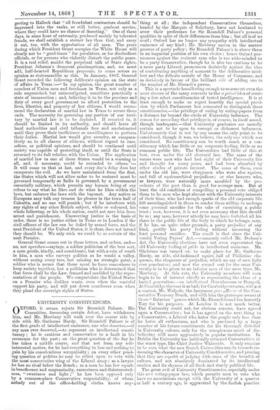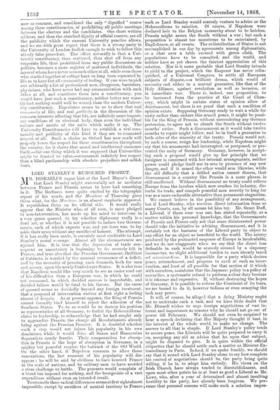UNIVERSITY CONSTITUENCIES.
OXFORD, it seems, rejects Sir Roundell Palmer. His Committee, foreseeing certain defeat, have withdrawn him, and Mr. Mowbray will walk over the course side by side with Mr. Gathorne Hardy. Sir Roundell Palmer is of the first grade of intellectual eminence, one who deserves,—if any man ever deserved,—to represent an intellectual consti- tuency ; he is cautious and conservative to a fault in his reverence for the past ; on the great question of the day he has taken a middle course, and that not from any self- interested motive, for he had everything to lose and nothing to gain by his conscientious scrupulosity ; on every other pend- ing question of politics he may be relied upon to vote with the most conservative wing of the Liberal army ; as a lawyer he has no rival below the Bench ; as a man he has few equals in beneficence and magnanimity, earnestness and disinterested- ness, " sweetness and light ;" he has been opposed only by a common-place Conservative respectability, of whom nobody out of the office-holding circles knows any-
gesting to Halleck that " all fraudulent contractors should be thing at all ; the independent Conservatives themselves, impressed into the ranks, or still better, gunboat service, headed by the Marquis of Salisbury, have not hesitated to where they could have no chance of deserting." One of these avow their preference for Sir Roundell Palmer's personal qualities in spite of their differences from him ; but all is of no avail ; Oxford has no longer any sympathy with intellectual eminence of any kind ; Mr. Mowbray moves in the narrow grooves of party policy ; Sir Roundell Palmer's is above them in an impartial position of his own choice ; hence Oxford pro- nounces against the eminent man who is too wide-minded to be a party Conservative, though he is also too cautious to be a mere party Liberal, pronounces decisively against the idea of contributing anything of moment to the deliberative intel- lect and the delicate morale of the House of Commons, and as decisively in favour of the brilliant rule of adding one to the number of Mr. Disraeli's pawns.
This is a spectacle humiliating enough to re-convert even the most sincere of the many converts to the a priori idea of creat- ing a few select constituencies of tested intelligence. It is at least enough to make us regret heartily the special provi- sion by which Parliament has consented to distinguish these constituencies, the privilege of voting by voting-papers from a distance far beyond the circle of University influence. The reason for according that privilege is, of course, in itself sound, though inadequate,—that University graduates are morally certain not to be open to corrupt or dishonest influences. Unfortunately that is not by any means the only point to be considered, though it was, we believe, the only one which was considered. No constituency can be worth much as a con- stituency which has little or no corporate feeling, little or no common public life. The Universities had little of this at best, even under the old electoral law. The mass of the voters were men who had lost sight of their University life and thought for many years, and had been absorbed by other circles of private interest. Tho mass of them, even under the old law, were clergymen who were also squires, and full of squirearchical prejudices ; or else lawyers who, as lawyers, were naturally more moulded by the pre- cedents of the past than is good for average men. But at least the old condition of compelling a personal vote obliged them to be men who kept abreast with the University interests of their time, who had enough sparks of the old corporate life left unextinguished in them to render them willing to undergo some personal sacrifice for the sake of exercising a public trust ; now, however, it is not even necessary that this should be so ; any man, however utterly he may have forfeited all his share in the public life of the body to which he belongs, may, if he has, on quite other grounds, a party prejudice of any kind, gratify his party feeling without incurring the least personal sacrifice. The result is that since the Uni- versity Voting Papers' Act,—commonly called Mr. Dodson's Act, the University elections have not even represented the old University feeling of pride in intellectual eminence. Mr. Gladstone was turned ou'-, to make place for Mr. Gathorne Hardy, an able, old-fashioned squire, full of Philistine elo- quence, the eloquence of prejudice, which no ray of new light ever penetrates ; and now the second seat for the same Uni- versity is to be given to an inferior man of the same type, Mr. Mowbray. At this rate, the University members will soon begin to be of interest chiefly as representing the ideas of a buried generation,—an intellectual Herculaneum or Pompeii. At Cambridge the case is as had; for Cambridge returns, wale) it a contest, Mr. Walpole, the lacrymose plus .rEncas of the Con- servative Treasury Bench, and with him the grotesque owner of those " Batavian " graces which Mr. Disraeli found too honestly Tory for his purposes. At London it is not much better. The University could not, for obvious reasons, have agreed upon a Conservative ; but it has agreed on the next thing to
a Conservative, a Liberal who hates the people only less than he hates all enthusiasm, and who is pardoned by a large number of his future constituents for his thorough disbelief in University culture, only for the conspicuous merit of dis- believing still more aggressively in popular institutions. In Dublin the University has habitually returned Conservatives of the worst type, like Chief Justice Whiteside. It only remains to he seen what the new Scotch Universities can do towards re- deeming the character of University Constituencies, and proving that they are capable of judging with some of the breadth of culture, and not absolutely dominated by its intellectual caution and its shyness of all fresh and sturdy political life.
The great evil of University Constituencies, especially under this new voting-paper law, which permits men to vote who have no associations except with the University of a quarter or half a century ago, is aggravated by the foolish practice
now so common, and considered the only " dignified " course among these constituencies, of prohibiting all public meetings between the electors and the candidates. One short written address, and then the starched dignity of official reserve, are all the publicity which the current University practice allows, and we see with great regret that there is a strong party in the University of London foolish enough to wish to follow this utterly false precedent. The effect naturally is that a Uni- versity constituency, thus scattered, thus shut off from any corporate life, thus prohibited from any public discussions on politics, becomes a mere register of scattered individuals, the mass of whom have never seen each other at all, while even those who studied together at college have so long been separated by life as to have lost all community of feeling. If you were to pick out arbitrarily a list of professional men, clergymen, barristers, physicians, who have never had any communication with each other at all, and constitute them into a constituency, you would have just such a constituency, neither better nor worse (in fact nothing could well be worse), than the modern Univer- sity constituency. Experience seems to us to show that real conitiowitll of life, and real publicity in the discussion of the common interests affecting that life, are infinitely more import- ant conditions of an electoral body, than even the individual culture and merits of the units which make it up. The University Constituencies will have to establish a real com- munity and publicity of this kind if they are to command respect at all. Such a choice as Oxford has now made will properly lower the respect for these constituencies throughout the country, for it shows that moral and intellectual eminence itself,—the one thing which it was supposed that Universities might be trusted to value,—commands infinitely less respect than a blind partizanship with obsolete prejudices and selfish fears.



































 Previous page
Previous page